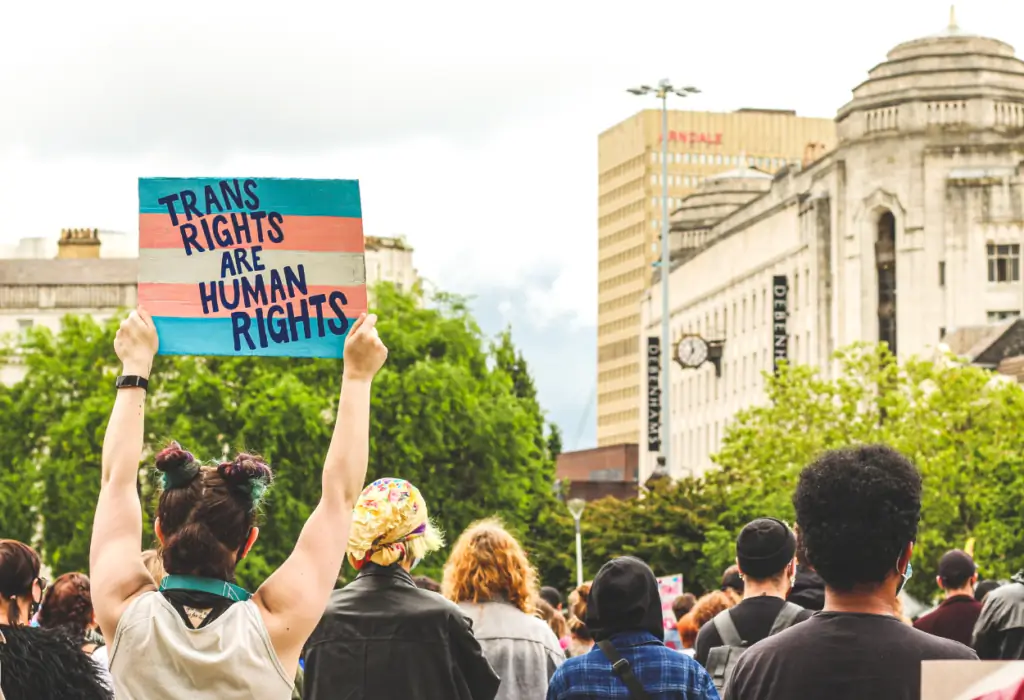
When she was in grade three, my daughter became the target of the school bully. He was well-known for his relentless commitment to making life terrible for other students.
The school administration recommended my daughter should avoid places where her bully might be. This meant her classroom, the hallway, the lunchroom, the play structure, and more. It would leave her with nowhere to go.
So, I called the superintendent. He suggested that my daughter move schools.
I was floored. I had heard of this, but I truly didn’t believe in a modern-day school system that the “solution” would be for an innocent child to give way to a bullying one.
And now it’s happening again. Except on a bigger scale.
Some bullies have decided it would be better for my daughter not to exist. Not to participate in sports. Not to use a public bathroom. Despite being a fully functioning, kind, accomplished (and taxpaying) member of society, she should make way for a few people with loud voices who would rather she wasn’t around.
It’s not okay. It’s desperately sad — and scary.
The only way I can move forward in the face of this is to tell myself it comes out of fear and ignorance.
So, let’s banish the ignorance. Here, my friends, is:
Transgender FAQ, the cis-mom edition
First some definitions:
Cis, which I just called myself, means I identify with the gender assigned to me at birth.
Trans is essentially the opposite. It means your gender identity or expression does not conform to your gender assigned at birth.
Being transgender is not a medical condition. It’s not a mental health condition. It’s not a psychological disorder.
With that in mind, let’s move onto the questions I often get or have often heard my daughter be asked:
Q: Have you had surgery?
A: Have you? Seriously, it’s not a polite question, and it’s not something most cis people would be expected to share. But if you just can’t stop thinking about the surgery question, you should know that many transgender people never have surgery. It’s not a prerequisite. (If you want a really detailed answer to this, I encourage you to listen to “Have you had the surgery?” | Inappropriate Questions | CBC Podcasts | CBC Listen).
Q: Are you on medication?
A: Are you? Again, not polite, and unless you’re the person’s healthcare provider, not appropriate. Also, just like surgery, some trans people take medication, and some don’t.
Q: Who do you have sex with? Also, how do you have sex?
A: Please tell me by now you’ve figured out the correct answer to these questions. And also, please reflect on whether you’d want to answer them yourself.
Q: Don’t I have the right to know if somebody I’m going on a date with is transgender?
A: Okay, first, I’m going to suggest that transgender people want to know who they’re dating as well, and their first choice might not be a cis person afraid that a transgender person is going to “trick” them into a date.
And sure, it would be awesome to know everything about the person you’re dating — like whether they already have a record of abuse, which, unfortunately, sometimes our system hides from us. Dating can be hard. Please be safe.
Q: Do you want other people to become transgender?
A: No. There’s no recruitment component — it’s not Scientology. Also, you don’t “become” transgender.
Q: How do I know what to call transgender people? It’s so complicated.
A: It’s really not. You call them by their name and their pronouns. Yes, sometimes we make assumptions that we shouldn’t or we misspeak — that’s okay. You can move past that. All you need to say is “sorry” then use the correct pronoun. Everybody will be cool with it.
Q: Shouldn’t women be able to feel safe in public bathrooms and change rooms?
A: Women should be able to feel safe everywhere. In our workplaces, and on public transit, and in our homes. That we’re not is infuriating, wrong, and tragic … but it’s not the fault of transgender people.
We have the numbers and the proof to know that intimate partner violence is an epidemic in Canada. On the other hand, there is no evidence that trans people pose a danger in public bathrooms, and in fact, we know they’re at much higher risk of harm when their bathroom use is restricted.
It’s against the law to assault a woman — those laws exist; we don’t need new ones. What we do need is the social and political will to take meaningful steps to protect women and girls, instead of turning around and pointing at a bogeyman.
Q: Don’t you agree it’s unfair for transgender women to play women’s sports?
A: Why? I don’t really understand the question, but maybe it’s about one of the following topics:
Safety: My daughter’s former roommate was a five-foot-one, 105-pound trans woman. My neighbour down the street is a six-foot-one, broad-shouldered cis woman. So, if the two played basketball, I’m assuming you’d be worried about the safety of the trans woman?
“Stealing” women’s spots: There is no evidence to support this. In Tokyo, 5,494 women competed in the Olympics. Approximately one percent of the population is transgender, so if trans women were accurately represented, 55 or so trans women should have competed in the Olympics. Three did. And, no, they didn’t power past all the cis-women athletes and “steal” their medals. Two didn’t advance to the medal rounds in their sports. The third, Quinn (a non-binary athlete) won a medal as a member of the Canadian women’s soccer team.
Testosterone: Honestly, folks, most trans women are trying to reduce their testosterone, but a lot of people don’t want to let them. Give the women their hormones and they’ll have lower testosterone levels than many cis women. (You knew cis women produce testosterone, right?)
Finally, please consider what you’re saying if you support a ban on trans girls and women competing in women’s sports — who polices that? Do random bystanders get to play the game of trying to “out” trans competitors? Will the team handshake be replaced by a pat-down lineup? Under a rule like this every single woman loses freedom and we’re letting the haters do it, while claiming it’s in our best interests.
And if you want to read a comprehensive (and easy-to-understand) analysis on the topic of trans athletes, I recommend this – The Inclusion of Transgender Athletes | Schuyler Bailar | PINKMANTARAY.
Q: What about the children?
A: What we know for sure is that talking to your kids about drugs doesn’t make them do drugs, talking to your kids about sex doesn’t make them have sex, and talking to your kids about transgender people doesn’t make them transgender.
My questions for you
Now it’s my turn to ask you a few questions. I’d appreciate it if you’d read these, and if they don’t apply to you, maybe in turn you could pose them to somebody who needs to think about them.
- Is there evidence to support the claims I’ve heard about transgender people, or are they based on assumptions and stereotypes?
- Why does the way someone else identifies or lives their life evoke a strong reaction in me?
- How does a transgender person living according to their true identity directly affect my life or well-being?
- What are the actual societal issues that threaten our safety and well-being (e.g. families living in poverty, domestic violence), and how does focusing on transgender individuals distract from addressing those issues?
- What would happen if I chose understanding and compassion over fear and judgment? How would that change my interactions and perceptions of transgender people (and everybody)?
Call to action
If I’ve made light of anything above, believe me, it’s all a façade. I don’t feel light about this topic. I feel extremely heavy.
I see my daughter avoid drinking water when we’re out in public because she doesn’t want to have to use a public bathroom. I know unpleasant things happen to her when I’m not around to be a buffer. I live in fear every time she’s out in the world that somebody will take exception to her, and emboldened by all the rhetoric, will hurt her. Or worse.
I desperately want her to stay as happy as she is now. We always loved her, but we see such a difference since she transitioned. Her identity is so clear. She makes other people around her happy.
I don’t want to see that snuffed out.
You can help. You can do things at any level that works for you. You can lobby or protest. You can put your pronouns on your LinkedIn or in your email signature. You can refuse to take part in a conversation that vilifies transgender people.
You can simply not make it worse. You can refuse to support platforms built on intolerance.
You can vote. Voting is powerful.
And asking questions is fantastic. When you question (and research) before forming an opinion, it’s amazing what you can learn.








